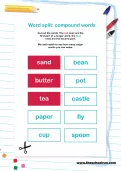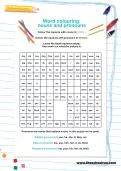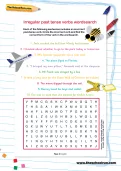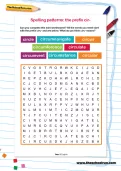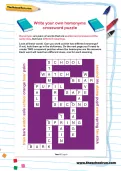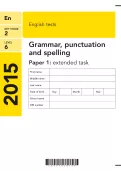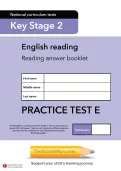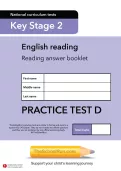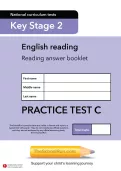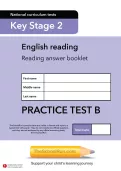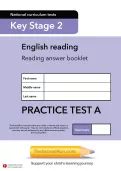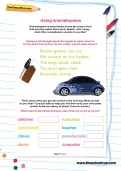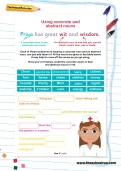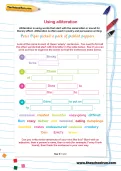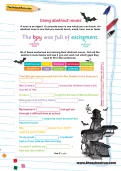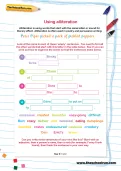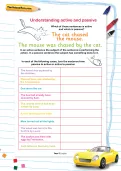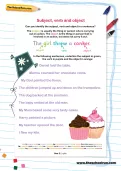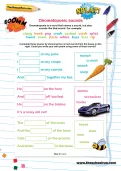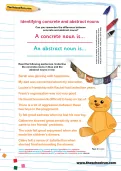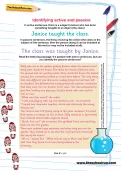Official 2015 English KS2 SATs papers (Level 6), free to download for at-home revision and practice. The Level 6 KS2 SATs were taken by very able children at the end of Year 6 until 2015 but are no longer used.
or
Register to add to your saved resources
Prepare for the KS2 SATs with some practice papers, written in the style of the new Year 6 assessments. Reading comprehension, spelling and grammar are part of the English test. TheSchoolRun mock papers are exclusive to subscribers.
or
Register to add to your saved resources
Already a subscriber? to view this content.
Our KS2 English SATs practice papers are exclusive to TheSchoolRun subscribers and written in the style of the new SATs. Each practice paper includes reading comprehension papers, a spelling test and a grammar test, as well as answers.
or
Register to add to your saved resources
Already a subscriber? to view this content.
Boost your child's confidence in the run-up to the KS2 SATs with some at-home practice. TheSchoolRun's mock papers, exclusive to subscribers, have been prepared to mirror the format of the official test.
or
Register to add to your saved resources
Already a subscriber? to view this content.
New-style practice SATs papers, available exclusively to TheSchoolRun subscribers to help children practise reading comprehension, spelling and grammar in the run-up to the May Year 6 assessments.
or
Register to add to your saved resources
Already a subscriber? to view this content.
Help your child get used to the new KS2 SATs format with our English practice papers, exclusive to TheSchoolRun subscribers. Each practice paper includes reading comprehension papers, a spelling test and a grammar test, as well as answers.
or
Register to add to your saved resources
Already a subscriber? to view this content.
Can you complete these sentences in your own way so that they are active sentences? Then can you complete these sentences in your own way so that they are passive sentences?
or
Register to add to your saved resources
Already a subscriber? to view this content.
Onomatopoeia is describing a sound by using a word that actually makes that sound. Splash, whir, clang... what other onomatopeic sounds do you like? Think about when you get into school in the morning. What sounds do you hear? Use this table to help you and then write your own poem similar to the one above (it doesn’t have to rhyme!).
or
Register to add to your saved resources
Already a subscriber? to view this content.
Each of these sentences is missing a concrete noun and an abstract noun; can you add them in? Once you’ve finished, underline concrete nouns in blue and abstract nouns in red.
or
Register to add to your saved resources
Already a subscriber? to view this content.
Alliteration is using words that start with the same letter or sound for literary effect. Alliteration is often used in poetry and persuasive writing. Look at the name in each of these ‘empty’ sentences. You need to find all the other words that start with this letter in the table below. See if you can work out how to organise the words so that the sentences make sense.
or
Register to add to your saved resources
Already a subscriber? to view this content.
A noun is an object. A concrete noun is one which you can touch. An abstract noun is one that you cannot touch, smell, hear, see or taste. All of these sentences are missing their abstract nouns. Cut out the
abstract nouns below and see if you can work out which gaps they need to fill in the sentences.
or
Register to add to your saved resources
Already a subscriber? to view this content.
Alliteration is the repetition of an initial letter or sound in closely connected words. Cut out the words in the table and sort them so that they are in groups according to their first letter. Now see if you can work out where they go in these sentences.
or
Register to add to your saved resources
Already a subscriber? to view this content.
In each of the following cases, turn the sentence from passive to active or active to passive.
or
Register to add to your saved resources
Already a subscriber? to view this content.
Use these groups of words to write three of your own active sentences. Then use these words to write three of your own passive sentences.
or
Register to add to your saved resources
Already a subscriber? to view this content.
In the following sentences, underline the subject in green, the verb in purple and the object in orange
or
Register to add to your saved resources
Already a subscriber? to view this content.
Most sentences have a subject (the thing or person the sentence is about), a verb (a doing word) and an object (something that is having something done to it by the subject). Can you find appropriate subjects, verbs and objects in the table below to fill in these sentence gaps? Then underline the subject in green, the verb in purple and the object in orange.
or
Register to add to your saved resources
Already a subscriber? to view this content.
Onomatopoeia is a word that names a sound, but also sounds like that sound. Complete these poems by choosing the correct words from the boxes on the right. Could you write your own poem using some of these words?
or
Register to add to your saved resources
Already a subscriber? to view this content.
A concrete noun is one that has a physical presence. An abstract noun is a concept you can’t touch, smell, hear, see or taste. Look at the following passage. Can you underline all the concrete nouns in blue and the abstract nouns in red?
or
Register to add to your saved resources
Already a subscriber? to view this content.
Read the following sentences. Underline the concrete nouns in blue and the abstract nouns in red.
or
Register to add to your saved resources
Already a subscriber? to view this content.
Read the following passage. It’s packed with active sentences, but can you identify the passive sentences?
or
Register to add to your saved resources
Already a subscriber? to view this content.
